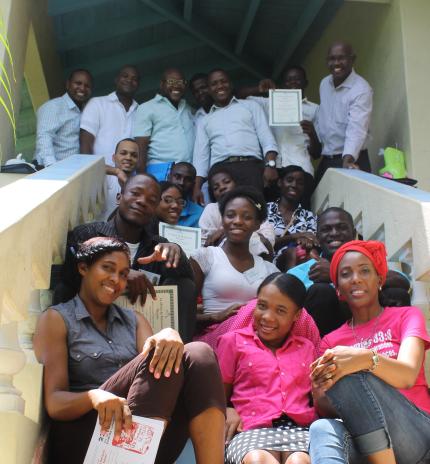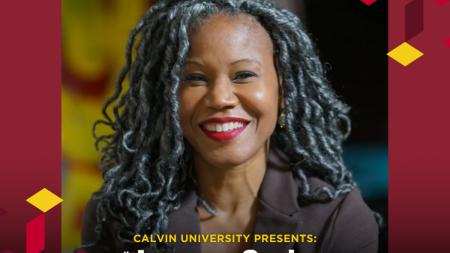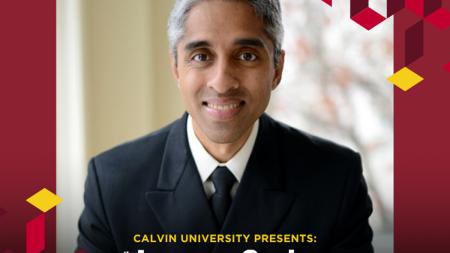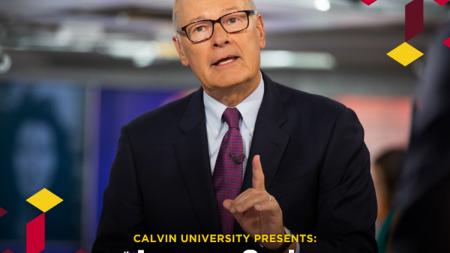Center Seeks to Bring Reconciliation in Dominican Republic

Members of the training on racial reconciliation in the Dominican Republic.
Viviana Cornejo
Yndira Santana Oquel was in her high school one day in the Dominican Republic when a fellow student stood up in class.
The student looked around and said there was a bad smell in the room. “Who’s wearing that Haitian lotion?” the classmate asked.
Oquel, who was born in the Dominican Republic but whose parents are from Haiti, was mortified by the question and couldn’t respond. She recalls that the only other student of Haitian descent in the class got up from her seat and defended their right as Dominicans to be in the country.
Although she was quiet that day in high school, Oquel worked up the courage to speak out and tell her story when she came into contact last year with the local Commission of Racial Reconciliation (CRR).
The CRR group formed after attending a Dance of Racial Reconciliation (DORR) workshop hosted by the Christian Reformed Church’s Office of Race Relations last September. The workshop was contextualized for the Dominican Republic and specifically focused on church leaders.
“Whenever someone spoke badly about Dominicans of Haitian descent, I felt a great impotence because I wanted to defend my ethnicity, but something stopped me — and that was what they will say about me, or the reaction this could bring,” Oquel says in a CRR newsletter in which she shares her story.
“It is worth mentioning that a few days ago I declared myself stateless (apatrida) because in the Dominican Republic I’m not accepted as a Dominican, and in Haiti I’m not accepted as Haitian.”
The term apatrida also became synonymous with “genocide” after a series of events that were set off by a 2013 Dominican Supreme Court ruling that stripped more than 200,000 Dominicans of Haitian descent of their birthright citizenship. Many of these individuals had been living in the Dominican Republic for decades, some since the 1930s.
Many international human rights organizations have criticized this ruling that came out of the Dominican Republic.
“After October 2013, an already marginalized underclass suddenly couldn't legally own property, vote, or work formally in the private sector. Nor could they send their children to school past the fourth grade,” according The Miami New Times.
After the law took effect and many people were stripped of their citizenship, Christian Reformed World Missions missionary Stephen Brauning stepped in and helped members of the Monte Plata CRC and other people in that community in the Dominican Republic obtain temporary residency or national identity cards. At that time, Saturnino Perez along with a lawyer developed a program to help people fill out forms and get documents signed in order to prevent deportation, even though they were Dominicans.
Later, Esteban Lugo, then director of the Office of Race Relations, and Viviana Cornejo, who works for the office, held a Restorative Practices workshop in Grand Rapids, Mich. Race Relations helped pay for Perez, now coordinator of the Commission of Racial Reconciliation, to attend.
Perez, who lives in the Dominican Republic and goes to the church in Monte Plata, is a justice promoter who has been supported by funding from World Missions and World Renew.
While in Grand Rapids, after learning about the value of the restorative practices and racial reconciliation training, Perez invited Cornejo to come to the Dominican Republic to offer the training to people he would bring together.
“The plan was to prepare people to facilitate trainings and dialogues on racism and discrimination,” said Cornejo.
“There were 15 participants. One was a pastor from Haiti who wanted to learn from Saturnino and do something similar in Haiti. There was also a lawyer who helped in answering lots of questions and gave a historical presentation.”
During the meeting in the Dominican Republic, they talked about and decided to form the Commission of Racial Reconciliation to be overseen and promoted by Perez.
“The CRR's vision is to walk with others and help them to become reconcilers and agents of change, to provide trainings and dialogues on racism, what it means, what it does, and how to cope with it,” said Cornejo.
Perez said he is doing this work with few resources out of a small office in Monte Plata that has no air conditioning and no printer or Internet — “but,” said Cornejo, “he has a heart full of passion.”
So far, said Perez, they have held several workshops and presentations, with more scheduled for April. In addition, they have visited five different churches and two communities.
“The participants have been Dominicans, and Dominicans of Haitian descent,” he said.
Looking to the future, Perez said, “I hope that our churches will be able to awake and put aside all kinds of racism and discrimination, that we learn to value ourselves, love ourselves, and see ourselves as the chosen body of Christ.”
He especially hopes that someday the Dominican Republic and the Republic of Haiti may be able to put aside all the differences that divide them today.
“I wish Dominicans of Haitian descent that were stripped of their documents will be recognized as Dominicans for being born on Dominican soil and get their documents back.”
Although he struggles to have the resources to keep going on the path to reconciliation, he is grateful for the support of the Office of Race Relations as well as the Dominican Center for Transforming Mission, which also provided with support and prayers from CRWM.
“Growing up as someone born to Haitian immigrants in the Dominican Republic, I personally know how painful it is to feel out of place and not welcomed. Defining your identity is a long and painful process,” said Mario Matos, director of the Dominican Center for Transforming Mission.
“Now, with the help of the Commission of Racial Reconciliation and other principles, we are able to embrace and celebrate our identity and to help others do it as well — and, more importantly, help individuals and communities to experience the joy of reconciliation,” said Matos.


